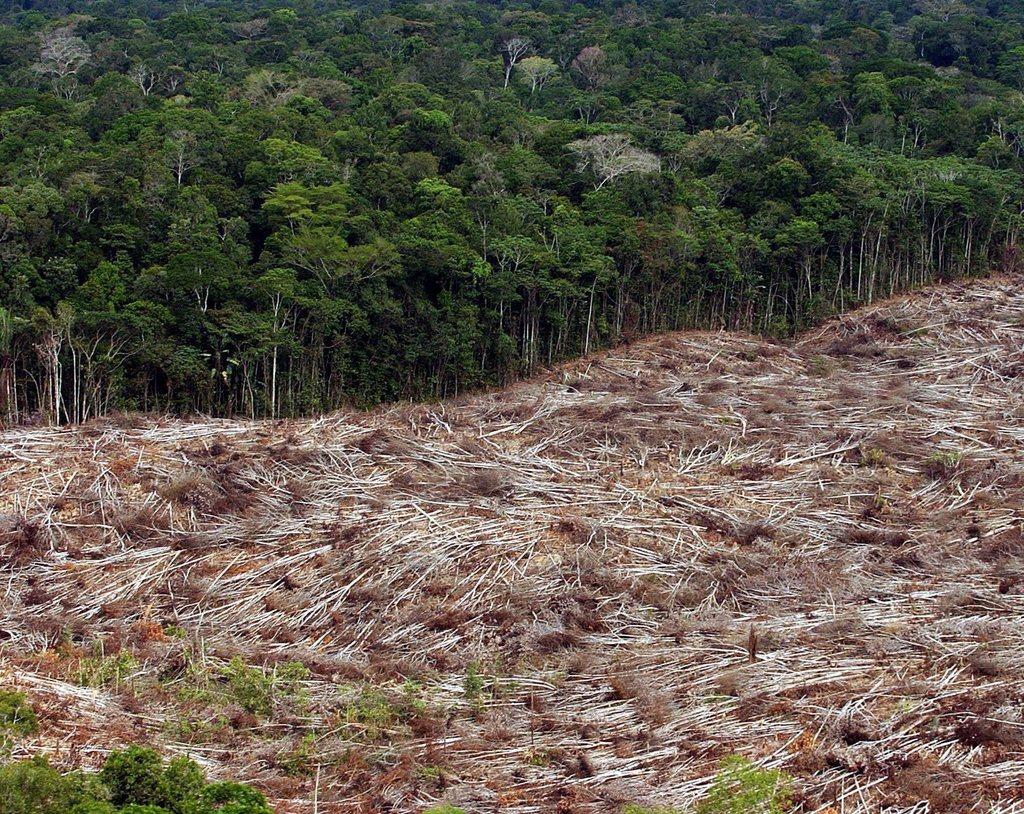Deforestation: Are banks still taking a big cut?

Big banks, including UBS and Credit Suisse, must limit their investments in palm oil, soy or beef production that can lead to deforestation.
Deforestation is expected to be incorporated into the agreement at the close of the COP21 climate change conference in Paris. Forests are considered the planet’s natural carbon-absorbing mechanism.
But effective action could be difficult if financial institutions do not look more closely at their relations with clients involved in chopping down forests to make way for cash crops.
Critics say existing certification schemes and industry-led initiatives promoting sustainability that banks like UBS and Credit Suisse have signed up to are weak.
Scott Poynton, founder of Nyon-based NGO the Forest Trust, argues that banks and financial services are not “pulling their weight”.
“In the case of the [multiple stakeholder] Roundtable on Sustainable Palm Oil [RSPO], you can deforest and still be certified. You can even have slave labour,” says Poynton who advises corporations and financial institutions on which commodity supply chains may play a role in deforestation, and helps them formulate effective policy.
Lowest common denominator
He added that such schemes involving lots of stakeholders are consensus-based. “You end up with the lowest common denominator in standards. Nothing changes on the ground.”
Earlier this year, a Dutch NGO, Bank Track, accusedExternal link Credit Suisse of attributing a $50 million loan to an Indonesian group, whose subsidiary logging company, APRIL, was described by Greenpeace as “the greatest threat to the Indonesian rain forest”.
In 2012, Bruno Manser Fonds, a Swiss NGO, claimed that UBS helped launder a Malaysian politician’s funds derived from illegal logging in the state of Sabah on the island of Borneo.
In response to the first case, Credit Suisse told swissinfo.ch by email that it “regularly engages in a dialogue with external stakeholders such as NGOs and takes plausible indications that clients are not compliant with our policies and guidelines seriously”.
Concerning Malaysia, the Swiss Attorney General Office opened proceedings against the bank as a result. It told swissinfo.ch that the investigation is ongoing and could not provide further information.
Better monitoring
Ethos, the Swiss Foundation for Sustainable Development, wants to see an improvement in the monitoring of loans in cases where the money is granted conditionally.
“When Credit Suisse says that it grants a loan with a condition, we would like to know more about the condition,” said Ethos CEO Vincent Kaufmann, explaining that monitoring was limited under the RSPO.
Kaufmann said UBS guidelines were more “precise” than Credit Suisse, specifying that the bank refuses “business with companies in conservation forests” and requires companies to commit to full certification by 2020.
Although local banks often step in when international institutions do not provide loans, according to Poynton, these smaller lenders cannot act in complete isolation. “They link into the international banking sector.”
Aware of the banks’ role and high stakes for the climate, various UN agencies (UNEP, FAO, UNDP) commissioned a study looking at risk policies by banks and investors on so-called soft commodities, such as palm oil, soy and beef.
The studyExternal link, according to Anders Nordheim of UNEP’s Geneva-based Finance Initiative (UNEP FI), assessed the policies of 30 banks, including UBS and Credit Suisse.
Benchmarking
Evaluations were based on publicly available information and formal policy statements, their strength through explicit environmental and social performance requirements and how policy is implemented, monitored and reported. On average, banks scored 58 out of 100 points, below a score of 67/100, established as a benchmark grade for best practice.
Individual scores were not published but the report did say the best performers were international development banks, such as the African Development Bank and the International Finance Corporation, as well as commercial banks Standard Chartered and Sumitomo Mitsui Trust Bank. They were praised for having “clearly invested resources in understanding, and addressing, risks related to soft commodities”.
“Banks, traders and investment managers have a considerable indirect natural capital footprint by lending to or investing in companies involved in unsustainable production, trade or sale of soft commodities,” the joint report said.
Achim Steiner UNEP’s executive director, said institutions need to “engage with clients, restrict credit to the most harmful practices and incorporate risks from natural degradation into financial analysis”.
The UNEP Finance Initiative has developed an online toolExternal link to help financial institutions benchmark their practices, develop risk policies and compare themselves to peers.
UNEP’s Nordheim said banks needed to integrate an understanding of risk into their various services and transactions, and be part of the financial analysis done on each transaction.
UBS and Credit Suisse
Credit Suisse’s 2014 Corporate Responsibility ReportExternal link states specifically that palm oil production represents one of the industries that is “particularly sensitive from a social or environmental perspective,” and that the institution has defined “specific global policies and guidelines”.
UBS’s Environmental and Social Risk policy frameworkExternal link lists its policies on palm oil, soy and timber. The bank endorses the Consumer Goods Forum’s Soft Commodities Compact, which states that “we commit to support the transformation of soft commodity supply chains by expecting producers to be fully certified according to applicable sustainability certification schemes”.
Christian Leitz, head of corporate responsibility management at UBS, explained that the bank has integrated advanced data analytics on companies potentially in breach of the bank’s policies, or subject to environmental and human rights controversies, into a web-based compliance tool used by its staff before they enter into a client or supplier relationship, or a transaction. If a “red flag” is raised by the tool, the case would be referred to an environmental and social risk officer.
Deforestation
Deforestation due to agricultural clearance represents the second biggest cause of greenhouse gas emissions after energy, or some 25-30 % of global emissions, according to the FAO. As trees contain 50% carbon, CO2 is released into the air when trees are cut.
Between 2000 and 2012 half of all tropical deforestation globally was caused by land clearing for commercial agriculture, according to Forest Trends.
In Indonesia, tree cover loss, largely due to palm oil plantations, averaged 1.5 million hectares a year since 2009, while in Brazil the annual rate of deforestation for the same period, which involved cattle grazing and soy production, was 2.3 million hectares, according to the World Resources InstituteExternal link.
According to a recent report by the British Overseas Development Institute, Brazil and Indonesia spent $40 billion in subsidies to the palm oil, soy, beef, timber and biofuels sector between 2009 and 2012, over 100 times more than what the countries spent to preserve the rainforests as part of the UN REDD+ programme.
Focus on Forests
At a special Tuesday sessionExternal link of the LPAA (Lima-Paris Action Agenda), a new focus was announced on partnerships to ensure healthy forests and to support their sustainable use in the livelihoods of a billion people worldwide.
“The success of the LPAA and its action area on forests relies on effective synergies between state and non-state actors, between investment and forest management – all together rallied behind sustainably managed forests as a common goal,” said Peru’s environment minister Manuel Pulgar-Vidal.
Annually, 12 million hectares of forest are destroyed, accounting for 11% of global greenhouse gas emissions.
The new partnerships, which were presented by leaders from government, the private sector, civil society and societies of indigenous peoples, are expected to complement the endorsement of forests as a key climate solution by 16 major forest countries on Monday.

In compliance with the JTI standards
More: SWI swissinfo.ch certified by the Journalism Trust Initiative











You can find an overview of ongoing debates with our journalists here . Please join us!
If you want to start a conversation about a topic raised in this article or want to report factual errors, email us at english@swissinfo.ch.